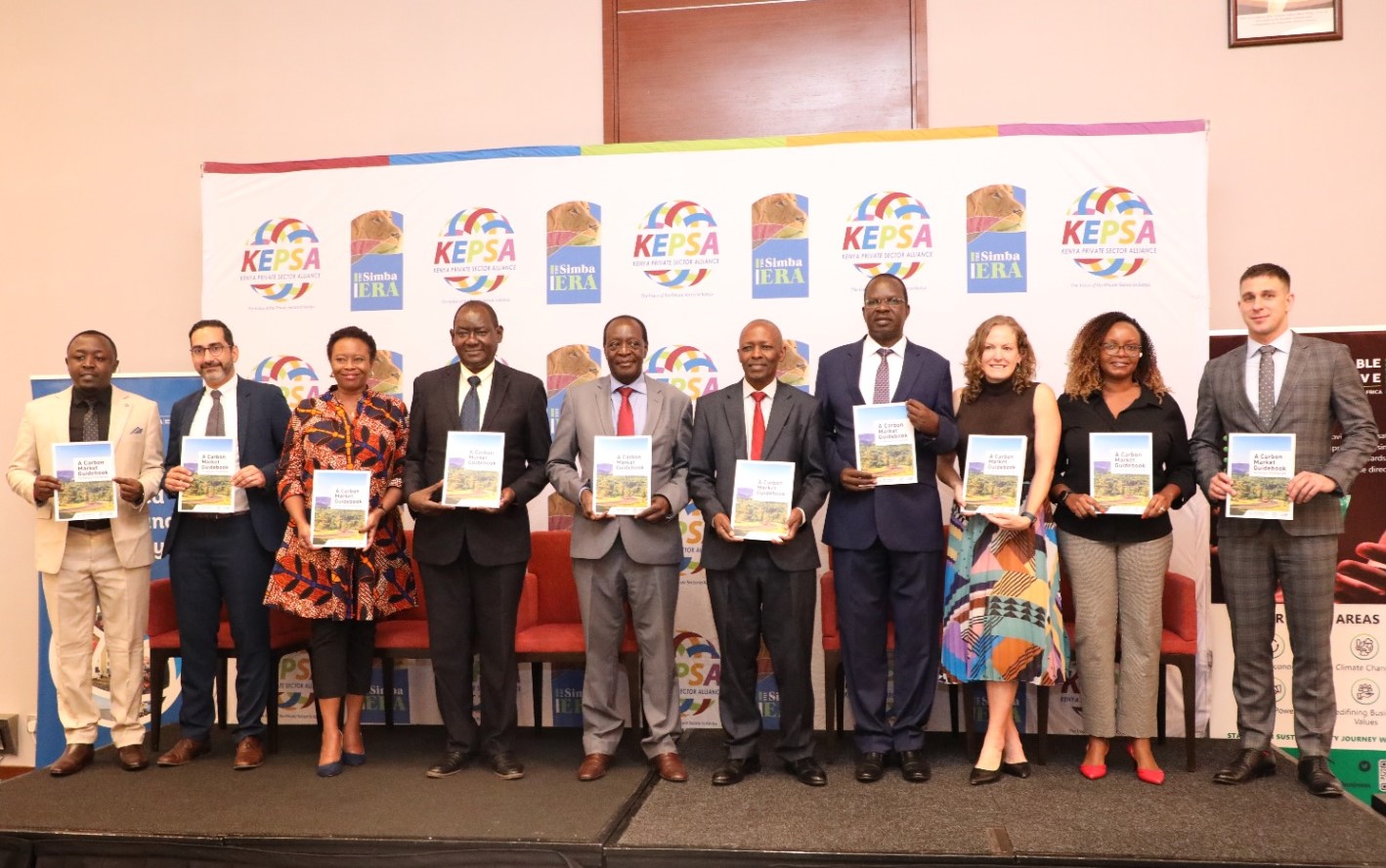On April 12th, 2024, KEPSA, through Sustainable Inclusive Business, in partnership with the World Bank, launched the Carbon Market Guidebook for Kenyan Enterprises at a stakeholder-engaging event in Nairobi. The guidebook aims to provide step-by-step guidance for Kenyan enterprises in various industries, including agriculture, waste management, environment, forestry, trade, banking, insurance, manufacturing, energy, transportation, construction, and hospitality, to navigate the complex and fast-evolving landscape of carbon markets.
The event brought together speakers from both the public and private sectors, including Dr. John Wandaka – Vice-Chair, KEPSA Environment, Water & Natural Resources Sector Board; H.E. Dr. Wilber Ottichilo – Chairperson of the Environment and Climate Change Committee, Council of Governors; Mr. Stephen Odua – Director of Business Environment from the Ministry of Investment, Trade and Industry; Mr. John Elungata – Secretary for Administration in the State Department of Environment and Climate Change; Isfandyar Khan – Lead Financial Sector Specialist, World Bank, among others.

In his remarks, Dr. John Wandaka appreciated that the carbon market has the potential to offer an alternative source of revenue for enterprises. “Carbon markets offer an alternative financing avenue that can empower enterprises struggling to access traditional climate finance, funding constraints hinder their ability to contribute meaningfully to climate action,” he said.
He added the exemplifying role that KEPSA has played in spurring green investments. “KEPSA has played a pivotal role in spurring green investments through initiatives such as co-chairing the Partnering for Green Growth and Global Goals (P4G) national platform with the National Treasury. Through this platform, we have facilitated the implementation of 14 partnerships aimed at promoting sustainable practices, including the Partnership for New Plastics Economy in Kenya and Sustainable Special Economic Zones (SEZs).”
From the perspective of the government, H.E. Dr. Wilber Ottichilo, lauded the timely release of the Carbon Market Guidebook, noting that it aligns with the urgent need to address climate change. “Article 6 of the Paris Agreement underscores the importance of voluntary cooperation among nations to achieve emission reduction targets, aligning with Kenya’s ambitious goals to abate greenhouse gas emissions by 32% by 2030 as part of our sustainable development agenda,” said Dr. Ottichilo.
He added that the government is ready to support the carbon market in Kenya. “Through collaborative efforts across different tiers of government, we ensure that climate actions are well-coordinated and aligned with the diverse needs and vulnerabilities across our nation.”
Isfandyar Khan noted that Africa has potential in the selling of carbon credits. Adding to that, Africa is among the least contributors to carbon emissions; hence, they should benefit from the carbon market.
Dr. Jackson Koimbori – Senior Circular Economy & Climate Change Coordinator at KEPSA reiterated about the key role the private sector will play in operationalizing the Carbon Market Guidebook. He noted that through funded initiatives such as capacity building, awareness campaigns, policy advocacy and pilot projects on the circular economy and climate change.
Other leaders from KEPSA who attended the event included Mr. Victor Ogalo – Deputy CEO; Ms. Emily Waita – Chair, Environment, Water & Natural Resources Sector Board; Ms. Susan Maingi – Chair, Trade & Industry Sector Board; Mr. John Kalungi – Vice Chair, Lands and Housing Sector Board; and Mr. Ben Roberts – Chair, ICT Sector Board.
The event also provided an opportunity for exhibitors to showcase innovative carbon market-related solutions. It also featured panel sessions on creating a policy-enabling environment for carbon markets in Kenya; and challenges and opportunities in the carbon market for Kenyan enterprises.
The Carbon Markets Guidebook provides credible information around regulations for understanding carbon credits as a way to mitigate greenhouse gas emissions. You can find a copy of the guidebook here.


